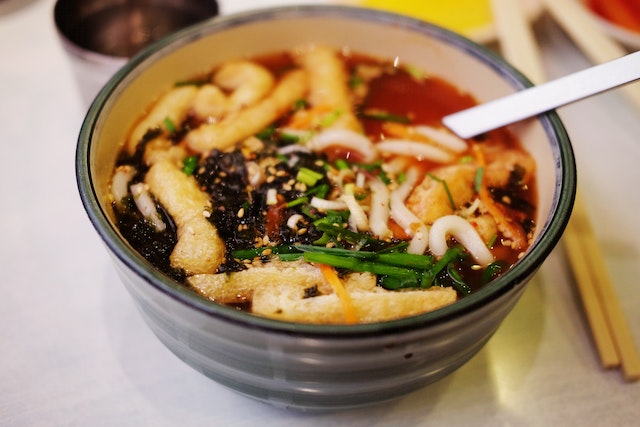Foods To Avoid If You Have Digestive Problem
Living with digestive problems can be challenging and emotionally distressing. The discomfort and disruption they cause can take a toll on our overall well-being. If you’re dealing with digestive issues, it’s essential to pay close attention to your diet, as certain foods can exacerbate symptoms and hinder the healing process. Here are some foods you may need to avoid if you have a digestion problem.
Fatty Foods

- Avoiding high-fat foods is important for individuals with digestive problems because these foods can slow down digestion. When digestion is slowed, it can lead to symptoms like bloating, gas, and discomfort.
- Research published in the World Journal of Gastroenterology indicates that high-fat diets can contribute to the development of gastrointestinal disorders, further exacerbating digestive issues
- Reduce high fat food we consume, particularly high-fat options like fried foods (eg. fried chicken / fried fish), fatty cuts of meat, and full-fat dairy products.
- Healthier cooking methods, such as steaming, grilling or baking (eg. by changing fried chicken to grill chicken) / scoop out the layer of oil on top if eating out will be helpful
Spicy Foods

- Spicy foods can be problematic for individuals with digestive problems, especially those with conditions such as acid reflux, gastritis, or irritable bowel syndrome (IBS).
- The fiery sensations caused by spicy foods can be overwhelming for individuals already dealing with digestive issues, such as acid reflux, gastritis, or irritable bowel syndrome (IBS).
- Studies published in the American Journal of Gastroenterology have shown that capsaicin, the compound responsible for the heat in spicy foods, can trigger heartburn and worsen symptoms of gastroesophageal reflux disease (GERD) (Bredenoord et al., 2016).
- Choosing milder seasoning alternatives like herbs and mild spices can still add flavor without aggravating symptoms.
Caffeine and Alcohol

- Caffeine may stimulate acid production in the stomach, leading to heartburn and indigestion
- Alcohol may irritate the digestive tract and worsen symptoms such as diarrhea or stomach pain.
- Opt for caffeine-free drinks and limit alcohol consumption, if possible
Carbonated Beverages

- Carbonated drinks may introduce excess gas into the digestive system, leading to bloating and discomfort and most of them are high in sugar, which can further exacerbate digestive issues.
- A systematic review published in Nutrients highlighted the association between carbonated beverage consumption and gastrointestinal symptoms such as bloating and belching (Cuperus et al., 2018).
- Stick to plain water for optimal hydration.
Processed and Sugary Foods

- Excessive sugar intake may lead to imbalances in gut bacteria and worsen symptoms such as bloating and diarrhea.
- Highly processed foods may contain additives, preservatives and artificial sweeteners that can exacerbate digestive symptoms.
- Choosing whole, unprocessed foods is beneficial for digestive health
By avoiding high-fat foods, spicy foods, carbonated beverages, caffeine, processed and sugary food, individuals with digestive problems can reduce the likelihood of experiencing symptoms such as bloating, gas, heartburn, and stomach pain. However, it’s important to note that individual tolerance to these foods may vary, and it’s always best to consult with a healthcare professional or registered dietitian for personalized dietary recommendations based on your specific condition.
If you’re experiencing digestive problems in Klang, it’s important to know your options for medical assistance. In case of emergencies, the emergency service in Klang is available to provide immediate care and attention. However, if you prefer a more specialized approach, considering a visit to a Specialist in Klang might be beneficial. You can choose from various specialists who have expertise in dealing with digestive issues.
Foods To Boost Your Immune System
In the face of illnesses and health challenges, a strong immune system becomes our shield, protecting us from harm. The food we consume plays a critical role in fortifying our body’s natural defense system. Here are some foods able to empower you on your journey toward a resilient immune system.
Guava/ Kiwifruit (Vitamin C: The Mighty Defender)

- Fruits like guava and kiwi contain high vitamin C, other citrus fruits such as oranges, grapefruits, and lemons are also rich in vitamin C.
- Supports immune cell function and aids in the production of antibodies.
- Requirement (RNI Malaysia 2017: adults (men & women 19-65 years old): 70mg/day
Yogurt (Probiotics: Guardians of the Gut)

- A healthy gut is key to a robust immune system
- Yogurt is not only delicious, but also a great source of probiotics
- Probiotics help maintain a healthy balance of gut bacteria, supporting immune regulation
- Opt for plain yogurt with live cultures to reap the maximum immune-boosting benefits.
Fermented foods

- Like kimchi, kefir undergo fermentation, resulting in the production of beneficial probiotics
- Incorporating fermented foods into your diet can enhance your immune system’s resilience
Mushroom (Beta Glucan: The Immune-Boosting Champion)

- It stimulates immune cells, enhances their activity, and supports overall immune function.
Red bell peppers

- Packed with vitamin C, as well as other antioxidants that support immune health
- Add sliced bell peppers to salads, stir-fried, or roasted vegetables medleys for a vibrant immune boosting punch.
Green tea

- Sip on a cup of green tea to enjoy its immune-boosting benefits
- Green tea contains catechins, potent antioxidants that support immune function and possess antimicrobial properties
Almonds

- These crunchy nuts are a nutritional powerhouse, especially when it comes to supporting immune health
- Great source of vitamin E, an antioxidant that helps in maintaining a strong immune system and protect cells from damage.
By embracing a diet with the immune boosting foods, you’re actively empowering your body’s defense against illness. These foods, like loyal companions, join you on your journey to wellness.
Foods For Cardiac Care
Caring for your heart is of utmost importance, and one way to do so is through a heart-healthy diet. By choosing the right foods, you can provide the nutrients and support your heart needs to thrive. Let’s explore a range of foods that promote cardiac health!
Fatty fish (Omega-3 Fatty Acids: The Heart’s Best Friend)

- Fatty fish like salmon, mackerel, and sardines are excellent sources of omega-3s.
- Omega-3 fatty acids help reduce inflammation and improve overall heart health.
- They can be steam, baked, or even grilled, giving your taste buds a delightful experience while soothing your heart.
Whole Grains: The Fiber Champions

- Whole grains, such as quinoa, brown rice, and oats, are excellent sources of fiber and plant sterol. They play a crucial role in reducing cholesterol levels and promoting heart health.
- Start your day with a bowl of oatmeal, swap refined grains for whole grain options in your meals, and relish the wholesome goodness that whole grains offer.
Legumes: Nature’s Cholesterol Fighters

- Beans, lentils, and chickpeas, commonly known as legumes, are dietary powerhouses for managing cholesterol.
- They are loaded with soluble fiber and are naturally low in fat, practically free of saturated fat
- Incorporate legumes into soups, stews, salads, or use them as a wholesome meat substitute. As you savor the hearty goodness of legumes, feel a sense of fortitude and nourishment embracing your heart.
Colorful Berries and Vegetables: Nature’s Antioxidant Boosters

- A rainbow of vegetables and berries, such as blueberries, strawberries, and raspberries, are not only a burst of flavor but also rich in antioxidants.
- These powerful compounds help reduce oxidative stress and inflammation, supporting heart health.
- Enjoy a handful of fresh berries as a snack, or incorporate them into smoothies, oatmeal, or salads. Also, you can always savor the flavors of the vegetables in salads, stir-fries, or roasted dishes.
Tomatoes

- Rich in lycopene, an antioxidant compound
- Reduced risk of heart disease, reduced LDL cholesterol (bad cholesterol) and improved blood pressure.
Olive oil

- Has the highest percentage of monounsaturated fat, which lowers “bad” LDL cholesterol and increases “good” HDL.
- It’s been shown to improve blood pressure and contains plant-based compounds that offer anti-inflammatory and antioxidant properties known to reduce the disease process, including heart disease.
Avocado

- A nutrient‐dense fruit, containing dietary fiber, potassium, magnesium, MUFA, and polyunsaturated fatty acids, as well as phytonutrients and bioactive compounds, which have been independently associated with cardiovascular health
- Reduced the risk of heart disease
By incorporating omega-3 fatty acids, enjoying the antioxidant-rich goodness of berries, savouring vibrant vegetables, nutrient-dense avocado, and olive oil and choosing whole grains, you are making choices that support your cardiac health. Let each meal be an opportunity to nurture and care for your heart. Remember, consulting with a healthcare professional or registered dietitian can provide personalized guidance based on your unique cardiac needs and health considerations.
– Article was written by Ms Li Zhe Xhuen, Dietitian
When it comes to cardiac health in Klang, it’s essential to have access to a reliable Consultant Cardiologist. A skilled Cardiologist in Klang can provide expert care and guidance for individuals concerned about their heart health. If you want to stay proactive, considering a health screening package in Klang can be beneficial.
Many healthcare providers offer comprehensive health screening packages that include specific assessments for cardiovascular health. Regular health screening in Klang can help detect potential risk factors or early signs of heart problems, allowing for timely intervention and prevention.

